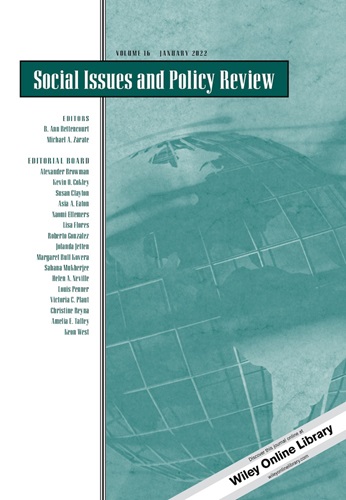The connections—and misconnections—between the public and politicians over climate policy: A social psychological perspective
IF 5.6
1区 心理学
Q1 PSYCHOLOGY, SOCIAL
引用次数: 0
Abstract
We review findings from social psychology and related fields to examine the bidirectional relationship between the public—what are their views about climate change and the need for policies to address the climate crisis—and the politicians who are making (or not making) climate policy and beholden to electoral constraints. We illustrate social psychological pressures that influence policy support and their relevance to how policies emerge from coordinated action and how barriers impede policy progress. We review two factors that have been the focus of research within communication, political science, and psychology and that are relevant to how climate policies are promoted (or undermined): activists and the media. We examine the process by which activists amplify and transmit the preferences of the public to politicians, and how research on persuasion and social norms helps understand how this effect can be amplified or diminished. We also describe how the media environment can amplify or diminish the roles of the public and the politicians in influencing each other. As the world confronts the climate crisis, research from social psychologists, environmental psychologists, political scientists, and communication scholars has examined the interrelations between the public, politicians, media, and activists, but largely in a disconnected way. The current paper provides a social psychological framework to integrate these approaches and, in so doing, suggest new directions for research and theory‐guided ways to influence policy around climate change.在气候政策问题上,公众与政治家之间的联系与错位:社会心理学视角
我们回顾了社会心理学及相关领域的研究成果,探讨了公众--他们对气候变化的看法以及制定政策应对气候危机的必要性--与制定(或不制定)气候政策并受选举制约的政治家之间的双向关系。我们阐述了影响政策支持的社会心理压力,以及这些压力与政策如何从协调行动中产生以及障碍如何阻碍政策进展的相关性。我们回顾了一直是传播学、政治学和心理学研究重点的两个因素,它们与气候政策的推动(或破坏)方式相关:积极分子和媒体。我们探讨了活动家将公众的偏好放大并传递给政治家的过程,以及有关说服和社会规范的研究如何帮助理解这种效应如何被放大或减弱。我们还描述了媒体环境如何放大或缩小公众和政治家在相互影响中的作用。在全球面临气候危机之际,社会心理学家、环境心理学家、政治学家和传播学者对公众、政治家、媒体和活动家之间的相互关系进行了研究,但这些研究大多互不关联。本文提供了一个社会心理学框架来整合这些方法,并以此提出了新的研究方向和以理论为指导的影响气候变化政策的方法。
本文章由计算机程序翻译,如有差异,请以英文原文为准。
求助全文
约1分钟内获得全文
求助全文
来源期刊

Social Issues and Policy Review
Multiple-
CiteScore
22.20
自引率
1.10%
发文量
9
期刊介绍:
The mission of Social Issues and Policy Review (SIPR) is to provide state of the art and timely theoretical and empirical reviews of topics and programs of research that are directly relevant to understanding and addressing social issues and public policy.Papers will be accessible and relevant to a broad audience and will normally be based on a program of research. Works in SIPR will represent perspectives directly relevant to the psychological study of social issues and public policy. Contributions are expected to be review papers that present a strong scholarly foundation and consider how research and theory can inform social issues and policy or articulate the implication of social issues and public policy for theory and research.
 求助内容:
求助内容: 应助结果提醒方式:
应助结果提醒方式:


